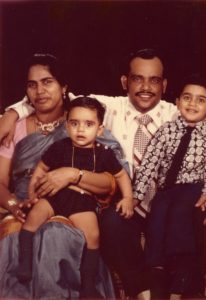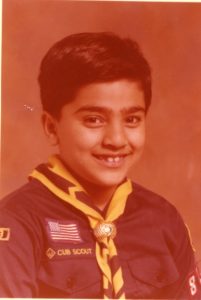Born: Apr. 3, 1935 & Died on Nov. 26, 1999 |

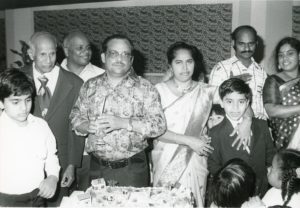
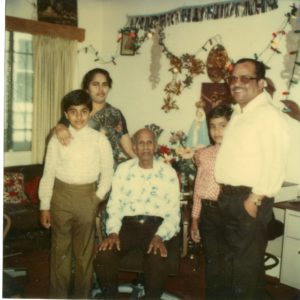
Mr. Luke P. ThottamMr. Luke P. Thottam departed from his beloved family on November 26, 1999 to start his eternal life in heaven. He is survived by Tessy Thottam (wife), Mr. Phoenix Thottam (son), Mr. Jameson Thottam (son) & Lisa Thottam (daughter).
Mr. Luke P. Thottam was a former Real Estate Tycoon of Southern California, who owned thousands of apartments and provided housing to thousands of people of Southern California. He also provided employments to hundreds of people in Southern California. He was born in Kerala, India. He was the President of 5th Estate Realty Corp., President of Thottam Properties and President of Associated Development Corporation. His father, Mr. John Peter Thottam was an Author and a well renowned businessman from a very traditional family in Trivandrum, Kerala, India. His aunt, Sister Mary Beninja (Mary John Thottam) was a very famous poet and a nun in Kerala. The funeral is scheduled for December 4, 1999.
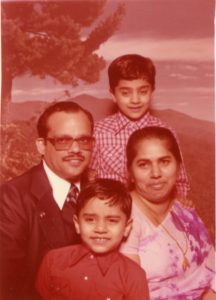
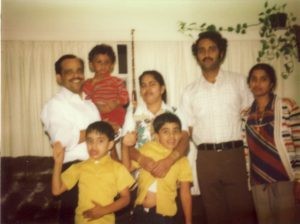
Viewing: December 3, 1999 - 4 P.M. to 8 P.M.
Place: Pierce Brothers Cunningham & O'Connor
Utter - McKinley MORTUARY
5959 Santa Monica Blvd.
Hollywood, California 90038
(323)465-5181
FUNERAL SERVICE:
Date: December 4, 1999 - 10:00 A.M. - Holy Mass
in the cemetry bigger chapel. Afterwards
funeral service
Place: Holy Cross Cemetery & Mausoleum Chapel
5835 West Slauson Avenue
Culver City, California 90230
PH: (310)670-7697; (323)776-1855
My Eulogy for My Father
Phoenix Thottam
(12/4/99)
Walt Whitman, (1819-1892): “O Captain! My Captain!”
Oh Captain! My Captain! Our fearful trip is done;
The ship has weather’d every rack, the prize we sought is won;
The Port is near, the Bell I hear. the people are exulting,
While follow eyes the steady keel, the vessel grim and daring;
But O Heart! Heart! Heart!
O the Bleeding drops of Red,
Where on the deck my captain lies fallen,
cold and dead.
Oh Captain! My Captain! Rise up and hear the Bells!
Rise up…for the flag is flung… For you the bugle trills;
For you the bouquets and ribbon’d wreaths ….For you the shores
a crowding…
For you they call, the swaying mass their eager face
a turning;
Here Captain! Dear Father!
This arm beneath your head
It is some dream that on the deck
You’ve fallen cold and dead.
My captain does not answer his lips are pale and still;
My father does not feel my arm, he has no pulse or will;
The ship is anchor’d safe and sound,
It’s voyage closed and done,
From fearful trip, the victor ship comes in with the object won;
Exult, O shores, and ring O Bells
But I mournful tread,
Walk the deck my Captain lies,
Fallen Cold and Dead
/////////////////
These were the words of Walt Whitman when he found out that Abraham Lincoln had been assassinated. The words capture some of how I have felt since my father’s death.
So, who was Luke Thottam? What was the chronology of his life? How did he effect people and the world around him? What did he accomplish? Who did he touch? What made him what he was and do what he did?
Well, to start off, Luke Thottam was my father. He was married to my mother Teresa, whom he loved deeply and who was there for him at his bedside for the last four years of his life. He was also father to my brother Jameson and my sister Elizabeth. He was a provider for us all. He was related to some of you as well. Perhaps most importantly, Mary and Moly, his two surviving sisters.
Dad came to the United States in 1972 as a relatively poor immigrant after having lived and worked for several years in Adis Ababa, the capital of Ethiopia, as a teacher of business and commerce for high school students. Dad’s father, my own grandfather and namesake, was a publisher, writer and architect who raised Dad in Trivandrum, the capital of Kerala, a state in Southern India from which many of you came. His own mother died when my father was three. My dad would often tell us, when we were young, that his greatest regret in life was the death of his mother. Her death effected my father profoundly.
However, Dad was always an eternal optimist with big dreams and with his eyes on the future. I remember when we were young he told us that “Thottam” meant “Real Estate” in Malayam, the language of Kerala. I found out only much later that it in fact means “Garden”. He himself left Kerala when he was young with hopes of eventually getting to the United States and ‘making it big there’. After working in East Africa for a few years he left, taking me and arriving in Chicago where he joined my Mother, a registered nurse, and my newly born brother, Jameson. Our family relocated in 1976 to Los Angeles where Dad left teaching and entered the real estate profession where he built a new life for himself and for his family. He was hard driving: a workaholic dedicated to an image he constructed of himself and to the well being of his family. Little else consumed his time.
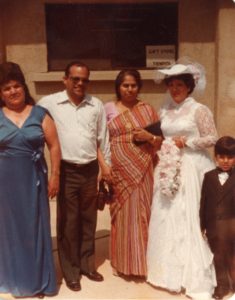
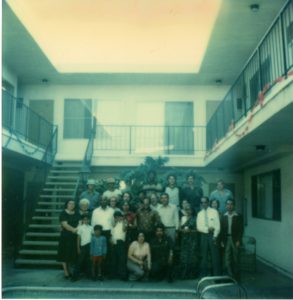
So what does Luke Thottam’s death mean? What does this funeral signify? These are questions I’ve been turning over in my head for the past week. In ancient India cremation and burial ceremonies of rural communities offered a nice ritual space for people to channel and experience the tremendous grief and sense of loss that sweeps them when someone who was loved and respected dies.
Western culture has little if any of these ritualized ceremonies. In America, our increasingly commercial society has become deficient in almost any designated active rituals that allow for the open expression of such grief. So instead, I stand here giving you a eulogy which is similar to what might in India or another culture have once been the “singing the life” of Luke Thottam.
However, I refuse to personally allow our cultural deficiency in active grief rituals to force my grief or feelings further underground. My father’s death has effected me, my family, his friends and family, his former employees and others I am sure, in ways that we are all only just beginning to feel and realize. He was a source of great stability and strength for so many people and in so many ways.
I have been having a lot of feelings and insights since my father’s death and we will see how long the feelings will allow me to speak.
By far the most important feeling I personally have had has been a combination of awe and of gratefulness. Gratefulness to have finally understood what it means to be able to experience the awesome power of love and to do so in the shade of a soaring, solid and stable tree that I now realize my father nourished and nurtured in his own unique way. My father himself was like a tree in many ways. A redwood, an oak tree, a coconut tree…you choose the metaphor. What’s important is that it was a tall shooting and aspiring tree. For me I’ll choose the redwood tree, since Redwoods grow here in California and since they are so tall shooting to the sky. Dad was a RedWood who’s taproot was anchored in the blood of his friends and family, of his unwavering dedication and a strong work ethic, and with branches and leaves that acted as a home for those around and those who chose to visit. I lived in that home and for that I am forever grateful. It’s an experience that I wish I could condense into a couple of words and then tell you. But that would take hours. Some of you know already. You were there and witnessed the ups and downs. It has been an extraordinary life, growing up and experiencing life with my mother and father.
Yet, despite the discipline and the often uncompromising nature, Dad’s tree sought to provide shade and shelter for everyone around my father to grow. Dad so wanted others to achieve and to grow. He enjoyed and reveled in the successes of everyone around him…not only his own. It is a beautiful thing for a man to be able to do that. I honor him for that. And boy, do I feel a little dwarfed by comparison with this soaring redwood tree.
At the same time, my father was a quiet man. He was never the centre of attention. He wasn’t the one who kept everyone laughing with his jokes. That was my cousin Jose’s responsibility. Dad, always did things so deliberately and calmly. In that respect, he has been a great role model for me.
When I think of dad I think of the little things. I think of his smile, the way his eyes would light up, and the way he consistently read the L.A. Times in the morning when we were growing up. For me, today, it is the New York Times, CNN on the Internet and The Economist.
My dad died on the day after Thanksgiving. Each Thanksgiving at my house was always a time for the family to be together but I always will remember that my father would give up a bit of that day to make sure that all of his employees and friends who lived near us each had a turkey and trimmings. My father knew how to build bridges and understood the value of relationships and of loyalty. For 20 years, I remember, he would go to the same old barber in downtown L.A. for the same $8 haircut. None of these things are extraordinary in and of themselves but, as I grow older, I realize and better appreciate that taken together the consistency and loyalty made up an extraordinary man. The secret of our dad was that he never lost his childhood sense of awe and his loyal appreciation of people and the possibility of what others often deem impossible.
He recognised the divine in people and encouraged many in Los Angeles, India and elsewhere. The fact that so many people are here today shows that he reached the hidden core of hundreds. Your presence is a wonderful comfort to us as a family. It’s good to know others loved him as much as we did. It won’t be easy to go on without him. There will be some days when we feel lonelier than others will. Yet I know that our dad will be with us in spirit, cheering us on.
During the last decade, my father suffered much and we are glad that suffering is over. He’s at peace now and all we ask is that if he is indeed up there, that he pray that we too will be at peace and that we each individually and collectively find love. That we find peace, truth and love. Dad has always been respected by those who knew him and respect is very hard to earn. You may have been quiet and removed in the last few years of your life….dad but your whole life said a lot,and in general what it said was beautiful and good. So beautiful and so good.
Finally now I would like to pay tribute to a special father with a short Eulogy verse from Siddhartha Gautama, an Indian who was the founder of Buddhism, in remembrance of my Father and in response to his his dying! (read the Buddha quote):
The Lord Buddha on Dying (563-483 B.C.) : A sheltered Himilayan prince, Siddhartha Gautama, the founder of Buddhism, was twenty-nine before he left his father’s palace grounds and saw for the first time, the death and misery in the rest of the world. He became a wandering ascetic, seeking enlightenment. He finally achieved it at the age of thirty-five, become a Buddha. Just before he died, at the age of eighty, he is said to have delivered the following words to his grieving disciples.
In the hour of joy it is not proper to grieve. Your despair is quite inappropriate, and you should regain your composure. The goal, so hard to win, which for many aeons I have wished for, now at last it is no longer far away. When that is won – no earth or water, fire, wind or ether present; unchanging bliss beyond all objects of the senses, a peace which none can take away, the highest thing there is; and when you hear of that and know that no becoming mars it and nothing ever there can pas away – how is there room for grief then in your minds? At Gaya, at the time when I won enlightenment, I got rid of the causes of becoming, which are nothing but a gang of harmful vipers; now the hour comes near when I get rid also of this body, the dwelling place of the acts accumulated in the past. Now that at last this body, which harbors so much ill, is on its way out; now that at last the frightful dangers of becoming are about to be extinct; now that at last I emerge from the vast and endless suffering – is that the best time for you to grieve? …
It is indeed a fact that salvation cannot come from the mere sight of me. It demands strenous efforts in the practice of yoga. But if someone has thoroughly understood this my Dharma, then he is released from the net of suffering, even though he never cast his eyes on me. A man must take medicine to be cured; the mere sight of the physician is not enough. Likewise there mere sight of me enables no one to conquer suffering; he will have to meditiate for himself about the knowledge I have communicated. If self-controlled, a man may live away from me as far as can be, but if he only sees my Dharma, then indeed he sees me also. But if he should neglect to strive in concentrated calm for higher things, then though he live quite near me, he is far away from me. Therefore be energetic, persevere, and try to control your minds. Do good deeds, and try to win mindfulness!”

